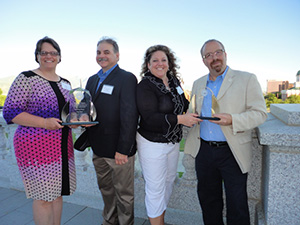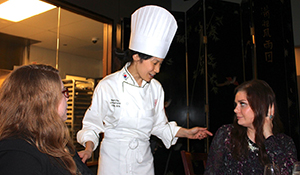Idaho Potato Commission Honors Innovations in Teaching at 2014 CAFÉ Leadership Conference
Wednesday, 10 September 2014 16:58
 Foodservice educators across North America earn recognition for their creativity in the culinary classroom.
Foodservice educators across North America earn recognition for their creativity in the culinary classroom.
The Idaho Potato Commission (IPC) recognized three educators in the 2014 CAFÉ-Idaho Potato Commission Innovation Awards at the 10th-annual Leadership Conference of the Center for the Advancement of Foodservice Education (CAFÉ) in Salt Lake City this summer.
“Our involvement in encouraging innovation and creativity among culinary instructors and students is very rewarding to us as well as the recipients,” says Don Odiorne, IPC’s vice president of foodservice. “After all, one of the goals of our Idaho potato growers is to reach the next generation of farmers, too, and equip them with the skills to continue to learn, progress and succeed in a changing world.”

 Pastry-chef instructors from Joliet Junior College, SAIT Polytechnic and The Pennsylvania School of Culinary Arts hope to become the 12th, 13th and 14th CMPCs in the United States.
Pastry-chef instructors from Joliet Junior College, SAIT Polytechnic and The Pennsylvania School of Culinary Arts hope to become the 12th, 13th and 14th CMPCs in the United States. “How are you today?”, though arguably better than nothing, is so overused and insincere that it fails to distinguish the service culture of your retail foodservice outlets. To employ an effective interaction strategy (and increase sales), understand that customers respond on conscious and unconscious levels to every aspect of their engagement with your instructors and student employees.
“How are you today?”, though arguably better than nothing, is so overused and insincere that it fails to distinguish the service culture of your retail foodservice outlets. To employ an effective interaction strategy (and increase sales), understand that customers respond on conscious and unconscious levels to every aspect of their engagement with your instructors and student employees. In the candy and chips aisles, Sriracha is undoubtedly the pepper of the year, as evidenced at the Sweets & Snacks Expo in May. And “free from” claims reign supreme in this industry. A foremost food-trends expert surveys the landscape of cross-over flavor demands between the snack shop and restaurant.
In the candy and chips aisles, Sriracha is undoubtedly the pepper of the year, as evidenced at the Sweets & Snacks Expo in May. And “free from” claims reign supreme in this industry. A foremost food-trends expert surveys the landscape of cross-over flavor demands between the snack shop and restaurant.